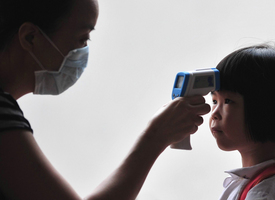
September usually marks the beginning of “flu season” in this hemisphere. This September, because a new strain of flu virus, H1N1 (initially known as the “swine flu”), made its appearance in Mexico last spring, and soon spread worldwide, the public health community is on special alert to fight what might be a particularly virulent flu.
Health care providers and scientists are on alert because the H1N1 influenza virus is believed to be similar to the virus of the 1918-19 pandemic. As in that pandemic a century ago, the most vulnerable to today’s H1N1 virus are children, teens and young adults.
Additionally, there are signs that there will be a second wave of the virus this year, just as there was in 1918-19. In the spring of 1918, during World War I, the flu, misnamed “Spanish Flu”, struck U.S. soldiers at military bases in the Midwest. There were few cases over the summer, but it returned with a vengeance the following fall.
At this time, there is some cause for optimism about the threat posed by H1N1, because health officials in Australia, where winter and the peak flu season are ending, report moderate severity for the H1N1 flu. However, the word of the day is still “caution.”
The seriousness of influenza infection is often underestimated. Globally, the death rate for seasonal flu is one-tenth of 1 percent, or a half million deaths yearly. The death rate in the 1918-19 pandemic is estimated to have been 2 percent, with 50 million deaths.
Originally the H1N1 virus infected only pigs, but mutated so that it could also infect humans. Because it is a microbe new to humans, the levels of immunity are low due to lack of previous exposure. Those who contract new strains of influenza are more vulnerable to severe infection and complications such as pneumonia, respiratory arrest, and even death. Because of this potential for severe disease, public health officials want to prepare for the worst.
Further, much of this year’s caution is informed by the terrible mistakes, miscalculations and disregard for scientific evidence that contributed to the severity of the flu pandemic of 1918-19.
Army doctors’ advice to avoid overcrowding in barracks and infirmaries was disregarded. Even though sailors on ships returning from Europe showed symptoms of infectious disease, they were allowed to disembark at U.S. ports.
In a particularly politically charged situation, politicians in Philadelphia were eager to impress Washington with a vigorous turnout for a war bonds rally. The health commissioner, an obstetrician/gynecologist with no experience in public health, and a political appointee to boot, made little to no effort to stop the rally. Everyone was urged to attend, resulting in crowded streets and a public gathering that spread influenza throughout the city.
Throughout the world, hospitals and clinics were woefully inadequate for the magnitude of the pandemic. Entire families were infected and left to suffer and/or die unattended at home. The sick were moved into hospital beds as soon as the previous occupants died. The dead could not be removed from homes and hospitals and buried fast enough.
Reading about the mishandling of the 1918-19 influenza epidemic, one is reminded of the terrible but avoidable losses that resulted from the lack of preparation for Hurricane Katrina. The ineptitude, the callous disregard for human life, and the inaction of the Bush administration are eerily familiar
In preparing for a possible pandemic today, public health officials are advising that individuals be vaccinated. Two doses of influenza vaccine are recommended for adults: one for seasonal flu, and one for the H1N1 strain. Priority will be given to those with chronic conditions (asthma, diabetes, etc.), pregnant women, the elderly, health care workers, and young children and infants.
The symptoms of influenza, including the H1N1 strain, are: fever greater than 100 F, sore throat, cough, stuffy nose, chills, headache and body aches, and fatigue. There are some reports of diarrhea and vomiting.
Influenza is spread from person to person (it is not related to the consumption of pork or pork products). The following precautions should always be followed, even by healthy individuals:
* Cough/sneeze into a tissue and discarded it immediately, follow with vigorous hand washing (for at least 18 seconds – the “ABC” song or a verse of “Yankee Doodle Dandy” takes 18 seconds, so sing while washing!) or vigorously rub an alcohol-based sanitizer on the hands.
* If no tissue is available, cough or sneeze into shirt sleeve (not hands).
* Hands should be kept away from eyes, nose and mouth at all times.
* Avoid hugs … sorry about that one!
* If possible, buy a thermometer (digital thermometers are about $10; they are also a big help in determining whether or not a student has “schoolitis” or is really sick).
* Stay home from work/school if ill. (Now is the time for legislation requiring paid sick leave for all workers, as well as paid family-leave.)
If you get the flu:
* Follow your doctor’s advice.
* Your doctor may order an anti-viral medication.
* Avoid close contact with others, especially the elderly, young children, infants, pregnant women and those with chronic or debilitating conditions.
* If tolerated, wear a mask around family members.
* Get plenty of rest.
* Clear liquids such as ginger ale, apple juice, water and tea help lower fevers, and keep mucus thin and easy to cough up (avoid alcoholic beverages).
* Cover coughs and sneezes as above.
* Wash hands frequently.
If possible, and while healthy, all individuals should try to find a “medical home” – a family doctor, clinic or health center where they can be seen for physical exams, immunizations and general preventive care. Often an after-hours phone consultation with such a provider can avert a trip to the emergency room.
The following web sites may be of interest: the World Health Organization web site and Centers for Disease Control weekly update – be sure to check out Dr. Clarke’s rap re the flu at this site.
And, it cannot be overemphasized: Wash hands frequently!

MOST POPULAR TODAY

High Court essentially bans demonstrations, freedom of assembly in Deep South

Zionist organizations leading campaign to stop ceasefire resolutions in D.C. area

U.S. imperialism’s ‘ironclad’ support for Israel increases fascist danger at home


UN warns that Israel is still blocking humanitarian aid to Gaza






Comments